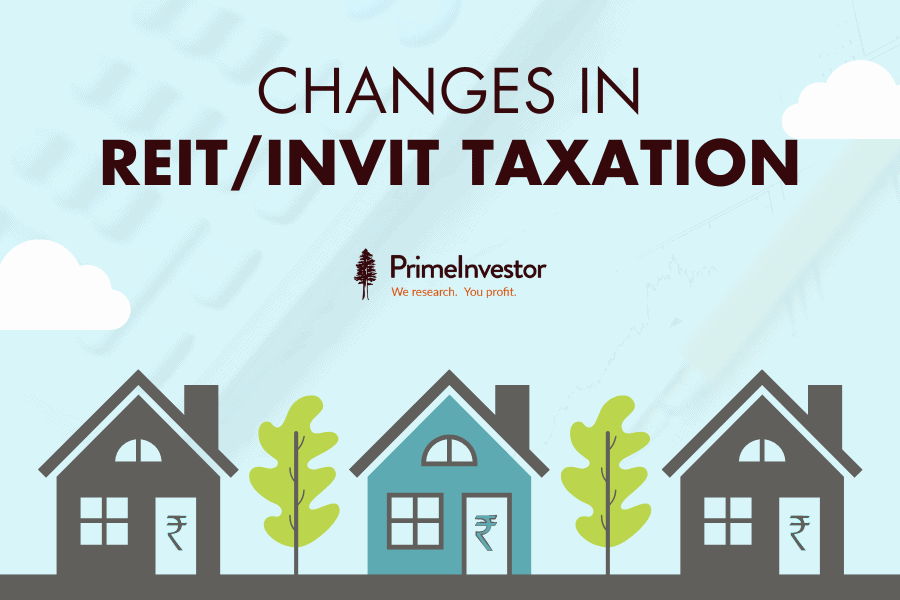For Indian investors looking for regular income with the possibility of capital appreciation, Real Estate Investment Trusts (REITs) and Infrastructure Investment Trusts (InvITs) are good vehicles. These entities own a bunch of real estate or infrastructure assets that throw up regular cash flows and distribute over 90% of their cash flows to their investors. As both their income and the value of the real estate or infrastructure portfolio they own can rise over time, REITs and InvITs offer the prospect of rising income with capital gains.
But a big factor that has spoiled the party for Indian investors has been the taxation of these vehicles. The recent Budget and subsequent amendments have added to the confusion.

REITs and InvITs are treated as ‘hybrid pass-through’ entities under the Income Tax Act. This infinitely complicates the tax treatment of the returns that unitholders earn from them. How the hybrid pass-through structure works is explained in this earlier article we wrote on REIT taxation.
The 2023 Budget added more knots to the tangle of REIT/InvIT taxation. Then this was followed by an amendment to the Finance Bill just before it was passed, which softened the Budget blow a bit. If you are an investor in REITs or InvITs confused by these flip-flops, here’s an attempt to explain the changes.
Background – REIT/InvIT taxation
A bit of background first. Rather than hold all their assets directly, REITs and InvITs hold many of their real estate or infrastructure assets through arms called Special Purpose Vehicles (SPVs). To help SPVs acquire and operate these assets, the REIT or InvIT either invests in the equity of each SPV or extends loans to it.
An SPV may pay out returns to its parent REIT/InvIT in three ways. One, it may earn a profit from operating or selling the assets it owns and distribute such income as dividend to the parent REIT/InvIT. Two, it pays interest on the loans taken from the parent. Three, when any loan taken from the parent matures, it returns this capital to the REIT/InvIT.
The cash flows that the REIT/InvIT distributes to its unitholders can therefore be made up of different types of income:
- Rental or leasing income from the assets it holds directly on its books
- Dividends received from SPVs
- Interest received from SPVs against loans given
- Repayment of the principal on loans by SPVs
- Other income which does not fall into any of these categories
Before Budget 2023, Sections 10(23FC), 10(23FCA) and 10(23FD) of the Income Tax Act specifically provide a pass-through status to the following types of income earned by an investor from a REIT or InvIT. This meant that if a REIT or InvIT made any distribution to its unitholders from the following types of income, they were taxed in the investor’s hands at his slab rates.
- Interest income
- Dividend income
- Rental/ leasing income from a real estate asset owned by a REIT
But these provisions did not cover one common type of distribution that was made by REITs and InvITs – cash flows from repayment of loans by SPVs. When REITs or InvITs received repayment of loans from their SPVs, this did not get taxed in their books because these were capital receipts. These repayments were not specifically granted pass-through status under tax laws. Therefore, they were not taxed in the unitholders’ hands either. This led to a portion of the income payouts by REITs and InvITs completely escaping tax.
Budget blow to yield
In its zeal to plug this ‘loophole’, the 2023 Budget proposed a new section 56 (2)(xii) in the income tax act, to say that from this fiscal, any sum received by a unitholder from a business trust (which covers REITs/InvITs) would be taxed as “income from other sources”, except if it was rent, dividend or interest covered above or income taxed at the entity level.
This amendment increased the tax incidence on REIT/InvIT investors in two ways.
One, it swept all REIT/InvIT distributions from loan repayments into the tax net. This effectively made all the components of income distributed by a REIT or InvIT to its investors taxable at the slab rate. As debt repayments and other income accounted for roughly 45% of the income distributed by Embassy Office Parks REIT and about 50% for Brookfield REIT, the market prices of these REITs fell sharply on the exchanges and are yet to recover fully.
The table below shows the break-up of recent distributions from the listed REITs and Indigrid Invit.
Second, where the investor was receiving money from the trust on redemption of units, the cost of acquisition was to be deducted from these receipts, for the calculation of tax. By stating that redemption proceeds received by investors would be taxed as “other income” after deducting the cost of acquisition, the Budget removed the capital gains tax treatment for units if redeemed by REITs/InvITs and made them taxable as “other income” at the slab rate. Note that this applies only to redemption and NOT to secondary market sale (transfer) of units.
Change in distribution taxation
After pushback from the REIT/InvIT industry, the government decided to water down the tax changes to REIT/InvIT taxation proposed above, to soften the blow on unitholders.
Section 56(2)(xii) amended to say that instead of “all incomes” only “specified sums” received by unitholders would be subject to tax at slab rates.
The “specified sum” is to be calculated in two steps.
- First, all the income distributed by the REIT/InvIT from sources other than dividend-interest/rent is to be added up until the present year (for which tax is being calculated).
- Second, from this, the original issue price of REIT/InvIT units (it will be the IPO price for public investors) is to be deducted. Only the remaining amount would suffer tax as “income from other sources.”
To illustrate, let’s assume the following: A REIT/InvIT had issued units at Rs 300 to its investors in 2018. It distributed Rs 8 per year as “other income” (repayment of debt and other sources) for the last 4 years.
Then, the sum of these distributions would be Rs 32 (i.e., Step 1 above). With the acquisition price of Rs 300, deducting it from the distributions would lead to a negative figure of Rs 268 (Step 2). Therefore, such distributions from the REIT would not be subject to tax in the current year. This tax exemption would continue into the future, until the payouts by way of other income exceed the initial issue price of Rs 300.
Given that all the listed REITs are of relatively recent vintage, and distribute only Rs 8-10 per year as repayment of debt/other income, and have issue prices of Rs 275-300, this component is likely to remain out of the tax net for the foreseeable future. In the case of IndiGrid Invit the issue price is lower at Rs 100, but the distributions feature a small debt/other income component of about Rs 2 per year.
Change in capital gains tax
But while giving away this concession with one hand, the amended Finance Bill also decided to take away some concessions with the other hand. Section 48 of the income tax act, which deals with capital gains tax on REIT/InvIT units was amended to say this - any other income including debt repayment proceeds received by the unitholder, if not taxed under section 56(2)(xii) would be reduced from the cost of acquisition of units while calculating capital gains.
What does this mean?
If a unitholder chooses to sell his REIT/InvIT units, then the untaxed amounts relating to repayment of debt distributions would be added to his capital gains and taxed as such.
To illustrate, assume in the above example that an investor bought REIT units at the original issue price of Rs 300 in 2018. As the example assumes, the REIT has distributed Rs 32 as debt repayment proceeds until now.
So, if he sells the REIT units now for Rs 350 in the market, his cost of acquisition of Rs 300 would be reduced by Rs 32 for computing capital gains tax. That is, the cost of acquisition will become Rs 300 – Rs 32 = Rs 268. The capital gains would be Rs 82 (Rs 350 – Rs 268), instead of Rs 50 under the old provision. Capital gains tax will have to be paid on this amount. Effectively, you will be paying tax on that Rs 32 you received until now on which you hadn’t paid any tax.
Note that this added tax incidence will arise only if you choose to sell your units and not if you continue to hang on to units.
Capital gains tax on REIT/InvIT is explained in the first section of this article.
What it all means
To simplify, here’s what the recent tax twists mean for REIT/InvIT investors:
- If your REIT/InvIT distributes income from sources beyond rent, interest and dividend, this income will become taxable in your hands at a future date. Usually, repayment of SPV debt proceeds is the big component apart from these three heads.
- If you hold on to the units, you will need to track the cumulative distributions that are not interest, dividend or rent. When these accumulated distributions exceed the original issue price of units (your buy price doesn’t matter), then incremental distributions over and above that will become taxable at your slab rate. Therefore, all income from a REIT/InvIT will become taxable in the year where its cumulative other income distributions exceed the issue price. The respective websites of each REIT/ InvIT have their distribution history. Whether the REIT/ InvIT will offer an easier way to track this remains to be seen.
- If you sell your units or they are redeemed by the REIT/InvIT, the cost of acquisition used to compute your tax liability will be reduced by the untaxed amount of other income. Sale of units in the secondary market will be treated as capital gains, but redemption will be treated as income from other sources.








21 thoughts on “What has changed with REIT/InvIT taxation”
Hi Aarati, PI team,
Currently PowerGrid InvIT is available at INR 100. I couldnt find its NAV to compare the fair market value of assets against the market price. They have maintained dividend record of INR 3 Rs per quarter. The forecast is also INR 12 for the current FY. Do you think it is a good investment at the current price?
The price has fallen from INR 140 peak to INR 100 now which is significant drop. It would be great if you could look at this and advise. I am already owning IndiGrid which is very stable and appreciate PI team for recommending this Invit.
We felt Indiagrid offered better yield visibility than Powergrid. But will revisit the two in coming weeks.
Thank you so much Aarati for such a succinct article. Yours is a great article I’ve come across regarding REiTs taxation.
ReIT taxation was already complex and the recent changes complicates it further. Holding my RE allocation (6-7%) in REiTs/InvIts as I don’t like to hold physical RE. Is there any MF with significant allocations to REiTs? On the other day, in your article about Icici Multi-asset fund, it was clearly mentioned its not for asset allocation purpose 🙂 Not seeking investment advice, but your views about REiTs please. Any advantages in holding them (esp if one is not actively seeking Fixed Income) ? Thanks.
~ thiyagu
Yes they are good to hold as an alternate asset. But Reits do have some issues in the near term as the outlook for office space offtake seems weak. Would prefer invits esp Indigrid which offers good visibility.
I my case the average cost of IndiGrid Invits is 139/- , assuming I sell this once the price reaches 145/- , and to date IndiGrid has distributed Rs 5.32 as Return of capital, will I be paying Capital gains (145-139)+ 5.32= 11.32.
Kindly let me know if the above calculation, correct?
Yes this is your capital gains. You will pay tax on this amount.
Some more action over the weekend with IndiGrid, perhaps this has to do with RE power .
Secured a loan of 1140/- CR from IFC
https://www.pv-magazine-india.com/2023/04/20/indigrid-raises-138-84-million-debt-finance-from-ifc/
Question is – is the RoC distributed from the time of IPO or RoC distributed, when the investor was holding duration has to be added back? if it is the former, it is really tedious and will get more complicated with time; on the other hand, if it is the later, at least some statements coming during the quarter can be kept and tracked. Knowing the nature of these sadistic sleuths, I am afraid that it will be the former but asking the question.
It is the former. Thanks, Vidya
Thx Vidya. All I can say is that I am amazed. Today is the Ex date of Embassy. Say, I buy at 318 and sell at 321, tomorrow ….do I pay tax on 3 (321-318) rupees + RoC from time immorial? that does not make any sense at all? I have never enjoyed any RoC by keeping this in 1 day….why should I pay for all the past sins?
Congratulations for an excellent article.Since it is capital gain will the benefit of indexation available in cost of acquisition
Please read the earlier article given as link for capital gain treatment. Vidya
@Aarti Krishnan…sent you a message in Twitter messenger, regarding a calculator that I had made, to reflect these changes. Pl reply, when you get a chance.
Thx
Kalyana Sundaram
Sure. Thank you!
Thanks Aarti for the attempt! Generally, I get a clarity on many aspects after going through PrimeInvestor write ups . Sadly, this time is an exception. As you have stated, it’s quite complicated.
That said, would be great to know what one should do with Indigrid investment, which was recommended some time back.
Thanks
Don’t blame you 🙂 just hold on to Indigrid as the yield is excellent and they don’t distribute too much as other income.
Why such unnecessarily over-complicated taxation? Taxes are complicated enough as is!
Provides employment to some 🙂
How does this affect the prime investor recommendation?
It doesn’t affect the buy reco. Indigrid has excellent yield and does not rely too much on debt repayment for distributions.
My 2 cents…Indigird yield (for 39% total tax) for the closing price as of 02/05 is 6.15% post tax (in comparison, the inflation insulated IRB Invit is 9.15%, Powergrid is 6.33% and Embassy is 6.22%). Indigrid is also nearing its debt limit allowed (64% vs 70%) and it is difficult to sustain this with increasing maint costs. They have raised more debt again this week and it can help in new projects but it is near that plateau, in my humble opinion. Having said that, they have the best of management but even they are not without drama – there have been top level exits and coming back and all that saga
Comments are closed.